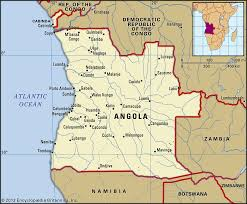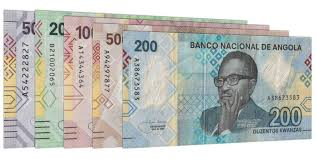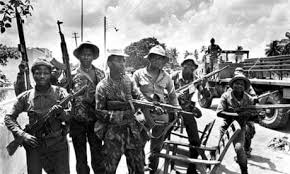Well, it is time to return to my normal run of the mill posts,
kicking off with the first country of the year and it is Angola.
The country is officially the Republic of Angola it is a country on
the west-central coast of Southern Africa.
The country has a varied terrain which encompasses tropical
Atlantic beaches, a labyrinthine system of rivers and Sub-Saharan desert that
extends across the border into Namibia. The country's colonial history is
reflected in its Portuguese-influenced cuisine and its landmarks including
Fortaleza de São Miguel, a fortress built by the Portuguese in 1576 to defend
Luanda.
It is the second-largest Portuguese speaking country in both
size and population, it has a population of 38.5 million, 10 million of which
live in the capital of Luanda.
Which is a port city on the west coast of Southern Africa. A
seafront promenade known as the Marginal runs alongside Luanda Bay. Nearby is
the well-preserved 16th-century Fortress of São Miguel, which now contains the
Museum of the Armed Forces. The fort has views of the harbor and the Ilha do
Cabo, a long, thin peninsula in the bay that’s home to beaches, bars and
restaurants.
It is the seventh largest country in
Africa and is divided into 18 provinces.
Their flag came into use when the nation gained independence
from Portugal on 11 November 1975. It is split horizontally into an upper red
half and a lower black half with an emblem resting at the centre. It features a
yellow half gear wheel crossed by a machete and crowned with a star.
As outlined in their constitution, the red half of the flag
signifies bloodshed – during Angola's colonial period, independence struggle,
and in defence of the country. The black half symbolizes Africa. In the
central emblem, the gear represents industrial workers and production, the
machete represents peasantry, agricultural production and the armed struggle,
and the red star, symbolizes international solidarity and progress. The yellow
colour of the emblem symbolizes the country's wealth.
The currency used is the kwanza there have been four different
currencies using the name kwanza since 1977. The currency derives its name from
the Kwanza River.
The prevalent religion is Christianity, followed by
traditional faiths. Roman Catholics make up the largest portion of the
population. There are other Christian denominations such as Protestants,
such as the Church of Our Lord Jesus Christ in the World, Seventh-day
Adventists, Methodists, Baptists.
Indigenous beliefs are still very important in Angolan culture
and are often practiced in addition to Christianity.
Muslims, Jews, Baha'is, and other religious groups make up about
9% of the population.
The government has become more tolerant of religious organizations since the formal abandonment of Marxism. However, the government still uses administrative control, co-optation, and restrictions to manage religious organizations. For example, in 2019, the police conducted a campaign against illicit traders and non-recognized churches, which some say called into question religious freedom in Angola.
Angola's National Institute for Religious Affairs (INAR) is responsible for the registration of religious groups and the oversight of religious activities. The law requires religious groups to submit documents defining their organizational structure, location, and other information. Religious doctrine must also conform to the principles and rights outlined in the constitution.
The current political regime in
Angola is presidentialism, in which the President of the Republic is also head
of state and government; it is advised by a Council of Ministers, which
together with the President form the national executive power.
Like other African nations it is not a safe place to visit.













I had no idea that Angola was once governed by Portugal - interesting fact! I did enjoy learning more about this country and how it's governed today, Jo-Anne. Blessings!
ReplyDeleteI am pleased you liked the post
DeleteThis comment has been removed by the author.
ReplyDeleteAs I recall, it wasn't too long ago that it was revealed that their entire financial system was essentially a giant Ponzi scheme to the benefit of the President and his son....
ReplyDeleteI did not know that
DeleteI had no idea they were split from Portugal either. And that's not that long ago! I always wonder who comes up with the flag designs. Apparently the daughter was involved in that also. We don't hear much about those goings on over here.
ReplyDeleteDon't hear much about such things here either
DeleteI had no idea at all about the Country. But while I felt upbeat about it...as I finished it seems to be, as you did in the last...not a safe place to visit and I had thought it was.
ReplyDeleteSo many places are not safe to visit
DeleteSo sad how so much of Africa suffers from poverty, violence and crime due to colonialism.
ReplyDeleteI agree very sad indeed
DeleteDidn't know much about this country at all. A country with a machete on their flag isn't a surprise to hear it is not safe to visit, I guess.
ReplyDeleteYeah what a strange thing to have on the flag
Delete